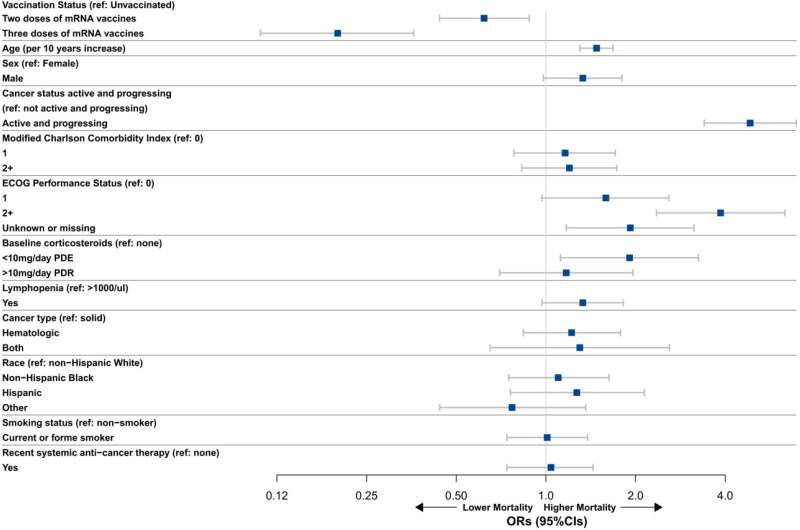Forest plot showing results of the multivariable logistic regression analysis following IPTW for the primary endpoint of 30-day mortality among patients with cancer and COVID-19. CI: confidence interval; ECOG PS: Eastern Cooperative Oncology Group performance status; OR: odds ratio; PDE: prednisone dose equivalent; ref: reference. Credit: The Lancet Regional Health - Americas (2023). DOI: 10.1016/j.lana.2023.100445
Breakthrough SARS-CoV-2 infections following vaccination against COVID-19 are of international concern and patients with cancer are highly vulnerable and susceptible to poor outcomes.
It is recommended that patients with cancer receive a 3-dose COVID-19 vaccination series but it is noted that their immunological response to the vaccine series may be lessened, notably among those with hematologic malignancies.
Utilizing data from the multi-institutional COVID-19 and Cancer Consortium (CCC19) scientists found vaccination with 2 or 3 doses of an mRNA vaccine prior to infection was associated with improved outcomes for patients with cancer diagnosed with COVID-19 in 2021 or 2022. Across all endpoints, including 30-day morality, ICU admission and hospitalization, the vaccine benefit was most pronounced for those patients receiving 3 doses.
This study shows vaccination against COVID-19 is an essential strategy to improve outcomes in this high-risk population. The results support guidelines that patients with cancer should receive at least 3 COVID-19 vaccine doses.
This analysis represents one of the largest cohorts with comprehensive clinical and biological data on vaccinated patients with cancer and breakthrough COVID-19 to date and is one of the first studies to evaluate breakthrough infections following the receipt of 3 doses of mRNA vaccines among patients with cancer.
The findings are published in The Lancet Regional Health—Americas.
More information: Toni K. Choueiri et al, Breakthrough SARS-CoV-2 infections among patients with cancer following two and three doses of COVID-19 mRNA vaccines: a retrospective observational study from the COVID-19 and Cancer Consortium, The Lancet Regional Health—Americas (2023). DOI: 10.1016/j.lana.2023.100445
Provided by Dana-Farber Cancer Institute
























